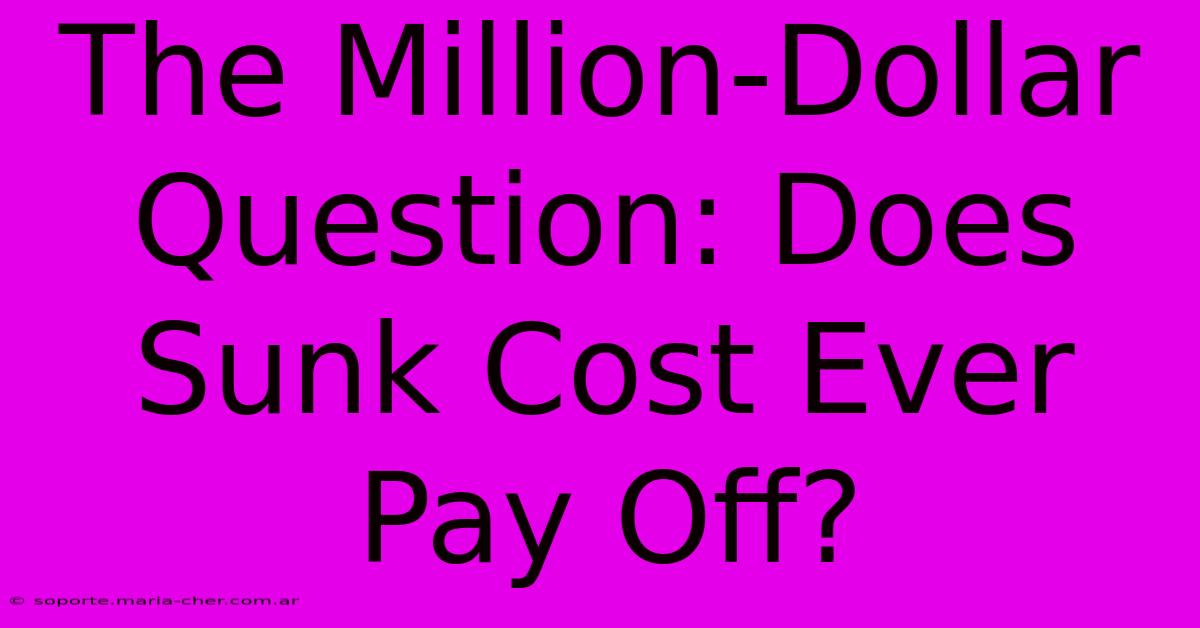The Million-Dollar Question: Does Sunk Cost Ever Pay Off?

Table of Contents
The Million-Dollar Question: Does Sunk Cost Ever Pay Off?
We've all been there. You've invested significant time, money, or effort into something – a project, a relationship, a course – and it's clearly not going as planned. Yet, the thought of walking away feels impossible. This is the sunk cost fallacy in action, and it's a powerful psychological trap that can cost us dearly. But does sunk cost ever pay off? The answer, as with most complex questions, is nuanced.
Understanding the Sunk Cost Fallacy
The sunk cost fallacy is the tendency to continue investing in something simply because we've already invested in it, regardless of whether continued investment is rational. It's that nagging feeling that quitting would somehow "waste" our previous investment. Examples abound:
- Finishing a terrible movie: You've already paid for the ticket, so you sit through the rest, even though you're thoroughly bored.
- Staying in a failing business: You've poured years and significant capital into a business that's consistently losing money, but you're reluctant to close it down due to the investment already made.
- Persisting in a toxic relationship: You've invested years of your life and emotions, making it difficult to walk away despite the unhappiness.
The key is that sunk costs are unrecoverable. The money, time, and effort already spent are gone, regardless of what you do now. Focusing on them clouds judgment and prevents rational decision-making based on future potential.
When Might Sunk Costs Seem to Pay Off?
While the sunk cost fallacy generally leads to poor outcomes, there are rare exceptions where persevering despite significant prior investment might yield positive results. These exceptions are often context-dependent and require careful evaluation:
1. Near-Term Completion and High Potential Reward:
If you're close to achieving a significant goal and the potential payoff is substantially greater than the remaining investment, it might make sense to continue. Consider a scientific research project nearing a breakthrough, or a software development project nearing launch. The cost of completing the project might be small compared to the potential rewards. Careful analysis of the remaining risks and potential gains is crucial here.
2. Reputation and Long-Term Strategy:
In some business contexts, abandoning a project, even a failing one, might damage reputation or harm long-term strategic goals. If the sunk cost is minor compared to the long-term brand damage, continuing might be the more strategic choice. This requires a broader perspective beyond immediate financial returns.
3. Learning Opportunities:
Sometimes, even a failed project can offer valuable lessons and insights. If the learning gained from continuing (even if ultimately failing) outweighs the costs, persevering might be justified. This is especially relevant in education or skill development.
The Crucial Distinction: Future Value vs. Past Investment
The core of the issue lies in distinguishing between past investment (sunk cost) and future potential. A rational decision should focus solely on the future: Will further investment yield a positive return, considering all factors? If the answer is no, regardless of past investment, the best course of action is to cut your losses and move on.
Making Rational Decisions: Tips to Avoid the Sunk Cost Fallacy
- Acknowledge the sunk cost: Don't try to ignore it, but don't let it dictate your decisions.
- Focus on future potential: Will continuing the investment lead to a better outcome than stopping?
- Set clear exit strategies: Define conditions under which you'll stop investing, regardless of past commitment.
- Seek external perspectives: Ask trusted advisors or mentors for objective opinions.
- Practice mindfulness: Be aware of your own biases and emotional attachments.
In conclusion, while rare exceptions exist, the sunk cost fallacy is a significant obstacle to rational decision-making. Learning to recognize and overcome this bias is essential for making sound judgments and achieving your goals. The million-dollar question isn't whether sunk costs ever pay off, but rather, is continuing to invest in this venture the most rational and profitable decision considering the future? Focusing on that question will lead you to better outcomes.

Thank you for visiting our website wich cover about The Million-Dollar Question: Does Sunk Cost Ever Pay Off?. We hope the information provided has been useful to you. Feel free to contact us if you have any questions or need further assistance. See you next time and dont miss to bookmark.
Featured Posts
-
Unlock The Secret Get Babys Breath In Bulk For A Fraction Of The Cost
Feb 04, 2025
-
Declutter Your Settings Master The Art Of Organization With Categories
Feb 04, 2025
-
Unveiling The Hidden Meanings Mothers Day Plants That Symbolize Her Love
Feb 04, 2025
-
Lighting Portraits Like A Pro Filters That Transform Your Shots
Feb 04, 2025
-
Canons Insider Picture Style Strategy For Model Shoots Guaranteed To Impress
Feb 04, 2025
